The Eternal Word Television Network (EWTN) is seeking Media Missionaries to help promote the network’s mission of sharing the Gospel through media. Media Missionaries are parish volunteers who promote EWTN programming through placing fliers in parishes, using social media, visiting college campus ministry e vents and in other arenas of daily life. EWTN lists 12 ways to be a media missionary on its web site – ewtnmissionaries.com.
vents and in other arenas of daily life. EWTN lists 12 ways to be a media missionary on its web site – ewtnmissionaries.com.
“Mississippi currently has only nine active Media Missionaries, leaving EWTN fliers in about 12 churches,” says Betsy Carraway, Mississippi Area Coordinator and Jackson St. Therese parishioner. “There is a great need for more.”
EWTN offers a wide variety of programs for Catholics from Father Robert Barron’s “Catholicism” series to daily Mass to sacred music concerts. “We recently brought Communion to a parishioner who, when we arrived, had a beautiful sacred music concert playing on the television; it was on EWTN. The music provided a very spiritual setting for the distribution of the Blessed Sacrament to this parishioner,” Carraway added.
Another service EWTN offers to keep Catholics in tune with programming is its e-newsletter “Wings.” To receive “Wings” go to EWTN.com and find the sign up box on the lower right side of the home page.
If you would like more information or to serve as an EWTN Media Missionary, visit ewtnmissionaries.com or contact Carraway at 601-857-2252 or betsycarraway@att.net.
Monthly Archives: February 2015
Bishop grants one year change to Rite of Election
Bishop Joseph Kopacz has delegated authority to pastors to celebrate the 2015 Rite of Election in the local parish instead of having one celebration in the Cathedral of St. Peter the Apostle. Several circumstances contributed to the decision according to Mary Woodward, diocesan chancellor.
“The Rite of Election is a celebration reserved for the bishop and ideally takes place in the cathedral, but the bishop can allow it to take place on the parish level on rare occasions,” said Woodward. “The rite will return to the cathedral in 2016,” she added.
The Rite of Election is the ritual moment when catechumens declare before the bishop their desire for baptism into the church. Each catechumen then signs the Book of the Elect and is welcomed by the bishop as a member of the Elect.
The bishop is the chief pastor of the diocesan church and is the symbol of unity in the church. This is why the rite normally is celebrated by him in the cathedral. Parishes have been asked to send the names of their catechumens to the diocesan liturgy office so that they may be included in the diocesan Book of Elect which will be placed on the St. Joseph Shrine during Lent and Holy Week.
Oración, ayuno, limosna

El Obispo Kopacz visitó y celebró misa en todos los colegios católicos de la diócesis.
por Obispo Joseph Kopacz
Hay una temporada para todo bajo el cielo, dice el inspirado texto del Eclesiastés, y, una vez más, el momento de renovación comienza para toda la iglesia, para cada comunidad y cada creyente. Es un tiempo que concierne a muchos católicos en nuestras vidas porque nos damos cuenta de que es tan fácil ser complacientes o indiferente a las cosas que realmente importan, o mejor dicho, las relaciones que realmente importan. El Señor nos ha dicho cual es ese camino para sus discípulos: amar al Señor nuestro Dios con todo nuestro corazón, alma, mente y fuerza y amar a nuestro prójimo como a nosotros mismos.
Nuestro vecino por supuesto es que cada persona viva, comenzando en el hogar y extendiendose a las márgenes del mundo. Estos dos mandamientos nunca están fuera de temporada, pero nuestros 40 días de viaje espiritual es un extra-ordinario tiempo para crecer en la gracia de Dios como los discípulos del Señor.
El Evangelio del Miércoles de Ceniza de san Mateo nos da el plan de acción que nos llevará más profundamente al corazón de Dios quien luego nos remite uno a otro en su espíritu. Es tan clara como uno, dos, tres, o la oración, el ayuno y la limosna. Nuestra experiencia de estas tres disciplinas cuaresmales nos ha demostrado que estos son los elementos básicos para poder superar nuestro egocentrismo, nuestro egoísmo y nuestro pecado.
La oración en sus muchas formas eleva el corazón y la mente a Dios. Ponemos a un lado nuestro ego para conocer mejor el corazón y la mente de Cristo Jesús. La Eucaristía es el centro, fuente y cumbre de nuestra oración, pero hay muchas corrientes de oración que alimentan el espíritu y el cuerpo del Señor, la iglesia.
En alguna ocasión cuando los apóstoles fueron incapaces de ayudar a un hombre asustado cuyo hijo estaba en las garras de un demonio, Jesús les aseguró que el miedo es inútil; lo que se necesita es confianza. Confiando en el poder de Dios no es posible sin constantes oraciones que alimentan el espíritu y dan vida al Cuerpo de Cristo.
El ayuno es a menudo el menos valorado de los tres mandatos cuaresmales. Como la oración sólo es posible cuando dejamos de lado nuestro valioso tiempo para centrarnos en Dios, el ayuno también requiere sacrificio porque estamos diciendo menos es mejor. Como sabemos, el Miércoles de Ceniza y el Viernes Santo son días de ayuno de consumo normal de alimentos y abstención de comer carne. Estos son los puntos esenciales de nuestros 40 días de peregrinación y siguen siendo muy importantes en nuestro calendario espiritual. Sin embargo, constituyen una forma de vida para nosotros que puede ser mucho más.
Menos es mejor. La disciplina del ayuno nos ayuda a reducir la comida y bebida que ingerimos para que podamos digerir más fácilmente la Palabra de Dios. Nos ayuda a deshacernos de la lentitud de espíritu que acompaña el exceso. El ayuno se aplica también a reducir al mínimo el nivel de ruido que inunda nuestra vida diaria. Ser creativo para lograr más silencio y tranquilidad para poder orar y pensar en Dios es la senda del ayuno.
Por ejemplo, bajarle el volumen al ruido que choca con nuestra vida es una forma de ayuno de este maremoto de estimulación que puede desgastar el espíritu. El ayuno y la oración, por lo tanto, van mano a mano. Ayunamos con el fin de orar más ardientemente; oramos con el fin de utilizar los bienes del mundo con una mayor integridad como discípulos del Señor.
La limosna se deriva de la libertad de espíritu que la oración y el ayuno están seguros de inspirar. No vivimos sólo de pan, y a través de la oración fervorosa y el ayuno podemos más pacíficamente compartir nuestro pan con los demás. Qué experiencia tan gozosa es poder dar de nuestro tiempo, talento y tesoro para que otros puedan lograr más en sus vidas.
La limosna a menudo se entiende como la caridad generosa hacia alguien que tiene necesidad, o, quizás, a una causa que merece la pena. Esto no es un error, pero la limosna puede ser mucho más. Es un movimiento hacia otros más necesitados, sea que viven en nuestra propia familia o alguien que posiblemente nunca podremos conocer personalmente.
Quiero concluir mi reflexión con algunas reflexiones del Papa Francisco quien habla desde el corazón de la iglesia en Cuaresma con un profundo entendimiento del drama humano.
“Por encima de todo, es un “tiempo de gracia”. Dios no nos pide nada que él mismo no nos ha dado primero. Amamos porque él nos ha amado primero. No es ajeno a nosotros. Cada uno de nosotros tiene un lugar en su corazón. Él nos conoce por nombre, él se preocupa por nosotros y nos busca cada vez que nos alejamos de él. Él está interesado en cada uno de nosotros; su amor no le permite ser indiferente. La indiferencia es un problema que nosotros, como cristianos, necesitamos confrontar.
“Cuando el pueblo de Dios se convierte en su amor, encuentra respuestas a las preguntas que la historia se hace continuamente. Uno de los desafíos más urgentes que quiero referir en este mensaje es precisamente la globalización de la indiferencia.
La indiferencia hacia el prójimo y hacia Dios también representa una verdadera tentación para nosotros los cristianos. Cada año durante la Cuaresma necesitamos oír una vez más la voz de los profetas que exclaman y perturban nuestra conciencia.
“Dios no es indiferente a nuestro mundo; lo ama tanto que dio a su Hijo por nuestra salvación. En la encarnación, en la vida terrena, la muerte y la resurrección del Hijo de Dios, la puerta entre Dios y el hombre, entre el cielo y la tierra, se abre una vez por todas. La iglesia es como la mano que sostiene abierta esta puerta, gracias a su proclamación de la palabra de Dios, su celebración de los sacramentos y su testimonio de la fe que obra a través de amor de hermanas”.
En esta Cuaresma, pues, hermanos y hermanas, vamos a pedirle al Señor: Fac cor nostrum secundum cor tuum, “Haz nuestros corazones como el tuyo. De esta manera recibiremos un corazón que es firme y misericordioso, atento y generoso, un corazón que no está cerrado, o indiferente al mundo que nos rodea”.
Prayer, fasting, almsgiving
By Bishop Joseph Kopacz
There is a season for everything under heaven, says the inspired text of Ecclesiastes, and once again the time of renewal dawns for the whole church, for each community and for every believer. It is a time that touches many Catholics at our core, because we realize that it is so easy to become complacent or indifferent about the things that really matter, or better said, the relationships that really matter.
The Lord has told us what is that path for his disciples: to love the Lord our God with all of our heart, soul, mind and strength, and to love our neighbor as our ourselves. Our neighbor of course, is every living person, beginning at home, and extending to the margins of the world. These two commandments never go out of season, but our 40 day spiritual journey is an extra-ordinary time to grow in God’s grace as the Lord’s disciples.
The Ash Wednesday Gospel from Saint Matthew gives us the blueprint that will take us deeper into the heart of God who will then turn us back to one another in his Spirit. It is as clear as one, two, three, or prayer, fasting and almsgiving. Our experience of these three Lenten disciplines has shown us that these are the basics for transcending our self-centeredness, our selfishness and our sinfulness.
Prayer in its many forms raises our hearts and minds to God. We place aside our ego in order to better know the heart and mind of Jesus Christ. The Eucharist is the center, source and summit of our prayer, but there are many streams of prayer that nourish the spirit and feed the Lord’s body, the Church. On occasion when the apostles were unable to help a frightened man whose son was in the grip of a demon, Jesus assured them that fear is useless; what is needed is trust.” Trusting in the power of God is not possible without faithful prayer that nourishes the spirit and gives life to the Body of Christ.
Fasting is often the most underrated of the three Lenten mandates. As prayer is only possible when we set aside our precious time to focus on God, fasting also requires sacrifice because we are saying less is better. As we know Ash Wednesday and Good Friday are days of fasting from normal food consumption and abstaining from meat. They are the hinges of our forty-day pilgrimage and remain very important days on our spiritual calendar. But they represent a way of life for us that can be so much more. Less is better.
The discipline of fasting helps us to reduce our intake of food and drink so that we can more easily digest the Word of God. It helps us to shake off that sluggishness of spirit that accompanies excess. Fasting also applies to minimizing the level of noise that floods our everyday life. Being creative about carving out more silence and quiet so that we can pray and think about God is the path of fasting. For example, turning down the volume of noise that collides with our lives is a form of fasting from this tsunami of stimulation that can wear down the spirit. Fasting and prayer, then, go hand in hand. We fast in order to pray more ardently; we pray in order to use the world’s goods with greater integrity as the Lord’s disciples.
Almsgiving arises from the freedom of spirit that prayer and fasting are sure to inspire. We do not live by bread alone, and through faithful prayer and fasting we can more peacefully share our bread with others. What a joyous experience it is to be able to give of our time, talent, and treasure so that others may reach higher in their lives.
Almsgiving often is understood as charitable generosity to someone in need, or perhaps to a worthy cause. This is not misguided, but almsgiving can stand for so much more. It is a movement toward others in need whether they live in our own family or possibly someone we may never know personally.
I want to conclude my reflection with some thoughts from Pope Francis who speaks from the heart of the Church on Lent with a keen understanding of the human drama.
“Above all it is a ‘time of grace.’ God does not ask of us anything that he himself has not first given us. “We love because he first has loved us’. He is not aloof from us. Each one of us has a place in his heart. He knows us by name, he cares for us and he seeks us out whenever we turn away from him. He is interested in each of us; his love does not allow him to be indifferent. Indifference is a problem that we as Christians, need to confront.
“When the people of God are converted to his love, they find answers to the questions that history continually raises. One of the most urgent challenges which I would like to address in this message is precisely the globalization of indifference.
Indifference to our neighbor and to God also represents a real temptation for us Christians. Each year during Lent we need to hear once more the voice of the prophets who cry out and trouble our conscience.
“God is not indifferent to our world; he so loves it that he gave his Son for our salvation. In the Incarnation, in the earthly life, death, and resurrection of the Son of God, the gate between God and man, between heaven and earth, opens once for all. The Church is like the hand holding open this gate, thanks to her proclamation of God’s word, her celebration of the sacraments and her witness of the faith that works through love, sisters.”
“During this Lent, then, brothers and sisters, let us all ask the Lord: Fac cor nostrum secundum cor tuum – ‘Make our hearts like yours. In this way we will receive a heart that is firm and merciful, attentive and generous, a heart which is not closed, or indifferent to the world around us.”
Clarksdale Sisters celebrate jubilee
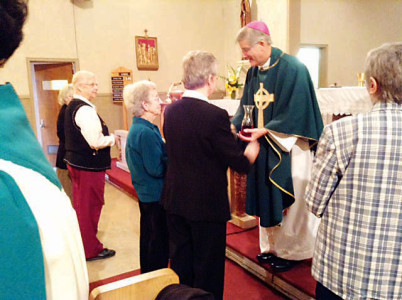
Sisters Theresa Shields and Maureen Delaney bring up the gifts during a Mass to celebrate their golden jubilees at Immaculate Conception Parish Sunday, Feb. 8. (Photos and story submitted by Sister Shields)
CLARKSDALE – Sisters Teresa Shields and Maureen Delaney, both SNJM, celebrated their Golden Jubilees on Sunday, Feb. 8, at Immaculate Conception Parish with the Eucharistic Liturgy celebrated by Bishop Joseph Kopacz. The Immaculate Conception Gospel choir led the congregation in spirited gospel songs.
The meditation after Communion, a well-known gospel standard, “I made a Vow,” touched the whole congregation when Teresa’s and Maureen’s names were sung in one of the verses. Parishioners, friends and sisters from neighboring towns then joined for a reception prepared by the women of the parish.
Both the parish and a representative from the City of Clarksdale presented the women with plaques commending them on their “…50 years of dedicated service to the church and to the children and families of the Mississippi Delta.”
Greenwood community hosts open house
GREENWOOD – The community of Franciscan Sisters of Christian Charity with sisters on mission at St.Francis of Assisi Parish hosted an open house Sunday, Feb. 8. The sisters missioned at St. Francis of Assisi are Sisters Elena Gonzáles, Annette Kurey, Kathleen Murphy and Mary Ann Tupy.
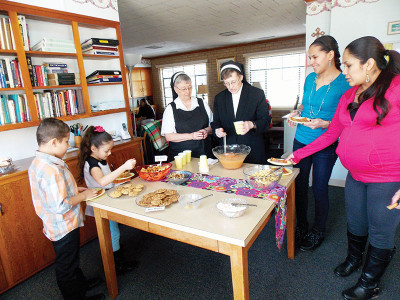
(l-r) Sebastian Esparza, Wendy Duron, Sister Kathleen Murphy OSF, Sister Annette Kurey OSF, Nohemi Esparza and Elizabeth Duron make selections from the snack table during open house held Sunday Feb. 8 in Greenwood (Photo and story submitted by Sister Tupy)
The open house started after the 11 a.m. Mass and continued after the 1:30 p.m. Spanish Mass. “During both liturgies, we Franciscan Sisters, along with the Franciscan Friars renewed our vows of poverty, chastity and obedience. We had between 23 and 25 people visit our convent home after each Mass. The people were so happy to be invited in and enjoyed the tour, the opportunity to pray and leave prayer intentions, the short slide presentation and the delicious snacks,” wrote Sister Tupy. Pope Francis has declared this year as the Year for the Consecrated Life, inviting religious men and women to celebrate their vocations and share their stories. Communities across the world are sponsoring open houses, days of prayer and service and are being honored.
Sister Tupy said people used the event as a time to remember the history of the religious community there and to ask questions about the current residents. “It has been over 50 years since I was in this house. We boys used to serve the early morning Mass around 6 a.m. here in the Sisters’ Chapel,” said one visitor.
Another said she had driven past the home every Sunday and wondered about what was inside. “We Franciscan Sisters of Christian Charity serving here in Greenwood counted this day as a blessing,” said Sister Tupy.
Becoming cardinal – call to greater love, patience
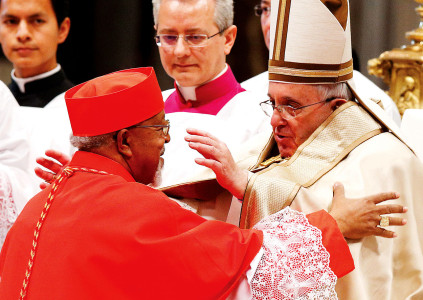
Pope Francis greets new Cardinal Berhaneyesus Souraphiel of Addis Ababa, Ethiopia, after presenting a red hat to him during a consistory in St. Peter’s Basilica Feb. 14. (CNS photo/Paul Haring)
VATICAN CITY (CNS) – In a Valentine’s Day ceremony to create 20 new cardinals, Pope Francis offered a meditation on Christian love and, especially, what it means for those who guide and minister in the church.
Retired Pope Benedict XVI attended the ceremony, sitting in the front row of St. Peter’s Basilica alongside the already existing members of the College of Cardinals.
Pope Francis’ meditation at the ceremony focused on the famous passage about love from St. Paul’s First Letter to the Corinthians (13:4-7), which begins: “Love is patient, love is kind.”
“All of us, myself first,” should be guided by St. Paul’s words, he said, because every Christian ministry “flows from charity, must be exercised in charity and is ordered toward charity.”
The patience Christian love calls for, he said, is a call to catholicity. “It means being able to love without limits, but also to be faithful in particular situations and with practical gestures. It means loving what is great without neglecting what is small.”
St. Paul says love is “not jealous or boastful” and truly being neither, the pope said, “is surely a miracle of love since we humans – all of us, at every stage of our lives – are inclined to jealousy and pride since our nature is wounded by sin.”
Not being “irritable or resentful” can be a challenge for a pastor, especially when dealing with other clerics, Pope Francis told the new cardinals.
“Charity alone frees us” from the temptation of snapping at others and, especially, from “the mortal danger of pent-up anger, of that smoldering anger which makes us brood over wrongs we have received,” he said. “This is unacceptable in a man of the church.”
St. Paul’s statement that love rejoices over what is right, the pope said, means “those called to the service of governance in the church need to have a strong sense of justice, so that any form of injustice becomes unacceptable, even those which might bring gain to himself or to the church.”
The new cardinals and all Christians, he said, can find a synopsis of their calling in St. Paul’s affirmation that love “bears all things, believes all things, hopes all things, endures all things.”
Christians, the pope said, should be “persons always ready to forgive; always ready to trust, because we are full of faith in God; always ready to inspire hope, because we ourselves are full of hope in God; persons ready to bear patiently every situation and each of our brothers and sisters, in union with Christ, who bore with love the burden of our sins.”
After the new cardinals professed their faith by reciting the Creed and formally swore fidelity and obedience to the pope and his successors, they approached Pope Francis one by one to receive their biretta, their cardinal’s ring and the assignment of a “titular” church in Rome, which makes them part of the Roman clergy.
(Copyright © 2014 Catholic News Service/United States Conference of Catholic Bishops. The CNS news services may not be published, broadcast, rewritten or otherwise distributed, including but not limited to, such means as framing or any other digital copying or distribution method in whole or in part, without prior written authority of Catholic News Service.)
Daydream dilemma: staying focused on now
IN EXILE
By Father Ron Rolheiser, OMI
A good part of our lives are taken up with daydreams, though few of us admit that and even fewer of us would own-up to the contents of those fantasies. We’re ashamed to admit how much we escape into fantasy and we’re even more ashamed to reveal the content of those fantasies. But, whether we admit it or not, we’re all pathological daydreamers; except this isn’t necessarily a pathology.
Our hearts and minds, chronically frustrated by the limits of our lives, naturally seek solace in daydreaming. It’s an almost irresistible temptation. Indeed the more sensitive you are, perhaps the stronger will be the propensity to escape into daydreams. Sensitivity triggers restlessness and restlessness doesn’t easily find quiet inside ordinary life. Hence, the escape into daydreams.
And what about the contents of those daydreams?
We tend to have two kinds of daydreams: The first kind are triggered more by the immediate hurts and temptations within our lives; for example, a lingering hurt or anger has you fantasizing about revenge and you play out various scenes of retaliation over and over again in your mind. Or an emotional or sexual obsession has you fantasying about various kinds of consummation.
The other kind of daydream we escape into is not so much triggered by the hurts and obsessions of the present moment but takes its root in something deeper, something classically expressed by St. Augustine in the opening lines of his Confessions (a hermeneutical key for his life and our own): You have made us for yourself Lord and our hearts are restless until they rest in you.
Simply put, we are over-charged for our lives, given infinite spirits and infinite appetites and put into this world wherein everything is finite. That’s a formula for chronic dissatisfaction. What’s our escape? Daydreams.
However these second kind of daydreams are somewhat different from the first. They aren’t so much focused on the immediate angers and temptations in our lives but rather are the habitual imaginary lives that we have interiorly fashioned for ourselves, fantasy lives that we play over and over again in our minds the way we might play and replay a favorite movie.
But there’s something interesting and important to note here. In these daydreams we are never petty or small, rather we are always noble and grand, the hero or the heroine, generous, big-hearted, immune from faults, drawing perfect respect, and making perfect love. In these daydreams we, in fact, intuit the vision of Isaiah where he foresees a perfect world, the lamb and the lion lying down together, the sick being healed, the hungry being fed, all restlessness being brought to calm, and God, himself, drying away every tear. Isaiah too fantasied about perfect consummation. His fantasy was a prophecy. In our earthy fantasies we might not prophesize but we do intuit the Kingdom of God.
With that being said, we still need to ask ourselves: How good or bad is it to escape into daydreams?
At one level, daydreams are not just harmless but can be a positive form of relaxation and a way to steady us inside the frustrations of our lives. Sitting back in an easy chair and sinking into a daydream can be little different than sitting back and turning on your favorite piece of music. It can be an escape that takes the edge off of the frustrations within your life.
But there’s a potential downside to this: Since in our daydreams we are always the hero or the heroine and the center of attention and admiration, our daydreams can easily stoke our natural narcissism. Since we are the center of everything in our daydreams we can easily become over-frustrated with a world within which we are not much the center of anything.
And there’s more: Etty Hillesum, reflecting on her own experience, suggests another negative consequence from habitually escaping into daydreams. She affirms that because we make ourselves the center of the universe inside our daydreams we often end up not being able to give anything or anybody the simple gaze of admiration.
Rather, in her strong words, in our daydreams we take in what we should be admiring. For this reason, among others, daydreams help block us from mindfulness, from being in the present moment. When we are all wrapped-up in fantasy it’s hard to see what’s in front of us.
So where should we go with all of this? Given both the good and bad within our daydreams and given our near-incurable propensity to escape into fantasy, we need to be patient with ourselves. Henri Nouwen suggests that the struggle to turn our fantasies into prayer is one of the great congenital struggles within our spiritual lives. Pierre Teilhard de Chardin shares in his journals that when he was young he struggled a lot with fantasy but, as he grew older, he was able more and more to stand in the present moment without the need to escape into daydreams. That’s the task we need to set before ourselves.
(Oblate Father Ron Rolheiser, theologian, teacher and award-winning author, is President of the Oblate School of Theology in San Antonio, TX.)
Grief healing workshops on tour in diocese
By MaureenSmith
JACKSON – The Office of Family Ministry has partnered with the Health Ministry office to take sculptor and grief counselor Bob Willis on something of a tour of the diocese. Willis will lead his unique grief workshop in five cities in March, Brookhaven, Vicksburg, Clarksdale, Tupelo and Meridian.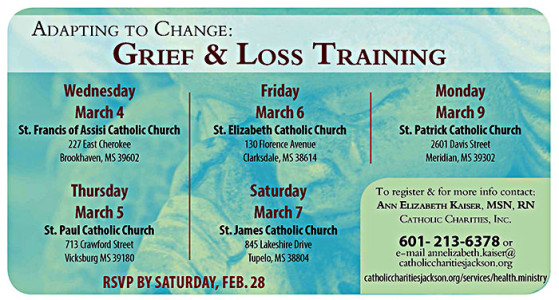
Each stop will include a daytime training session from 8:15 a.m. to noon for health professionals and an evening session around 6 or 6:30 p.m. for anyone who may feel the need. Check with the individual parish for exact times. The office is working to make continuing education credits available for the professionals.
“Adapting to change, grief and loss training,” as the workshop is called, will include a look at different forms of grief, theories of how grief progresses, a look at normal responses to grief, a guide to ways to express feelings of loss and will identify and develop referral and community resources.
Willis has a unique presentation style. In addition to presenting the latest research and academics, he sculpts while he speaks. The sculptures, sometimes a broken heart and sometimes a bust of Christ wearing a crown of thorns, help illustrate many of the points he makes.
Willis came to the diocese in 2014 to present at Jackson St. Richard Parish as well as in Brookhaven, where several Faith Community Nurses serve at St. Francis Parish. Cheri Walker is one of those nurses. She said Willis’ presentation was particularly timely. A pair of hospital employees had recently lost family members and the staff had cared for several infants with chronic illnesses.
“We are caregivers in a hospital setting and sometimes we get a bit overwhelmed,” said Walker. She said she learned many useful things from the workshop. One of Willis’ suggestions is to ask a grieving person how he or she met the loved one they lost. “This opens up positive memories, early memories of the love you had. This helps take away the anguish and I think that’s a real gift,” said Walker.
It is important to note that death is not the only form of grief addressed in the workshops. “This is applicable to any major life changes. A child leaving home can cause grief, or a divorce. This is not just about death,” she said.
Willis emphasizes that adjusting to any big change in life can make us feel a sense of loss and stress and this can trigger a grief reaction. He offers strategies for caregivers, grievers and friends to use during times of grief. His work is based in the gospels and he brings scripture and prayer into his workshops as well.
Walker said she learned something every time she saw Willis present and encourages everyone who is a caregiver or feeling some kind of loss or grief to attend.
See the sidebar for dates and locations and registration information.
Knights ready fryers, kitchens for Lent
OXFORD – The Knights of Columbus Council 10901 set aside the weekend of February 7-8 to clean and check the operation of their catfish fryers and cookers in anticipation of the first Lenten fish fry of 2015 to be held on Friday, Feb. 20, at 6 p.m. The traditional Lenten fish fry is held every Friday night during Lent at St. John the Evangelist Parish.
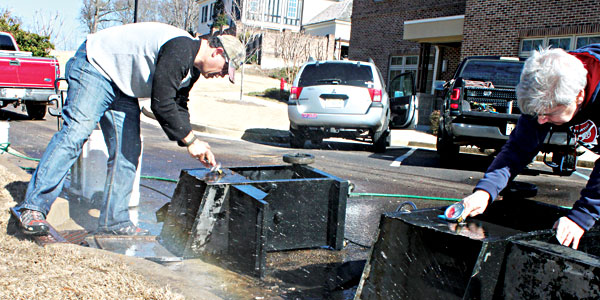
Grand Knight Burke Nichols (left) and Knights of Columbus member Ricky Berry scour the well-used fish fryers in anticipation of the first Lenten fish fry at St. John the Evangelist Parish on Friday, Feb. 20. (Photo and text submitted by Gene Buglewicz.)
“The Knights catfish meals have been a Lenten tradition in Oxford for years. It’s the best deal in Oxford on Friday nights,” said Grand Knight Burke Nichols. Cost is $8 per plate for a generous helping of Mississippi catfish filets, hushpuppies, cole slaw, drinks and dessert.
Proceeds from the events support St. John the Evangelist charitable activities in the Oxford-Lafayette County area as well as University of Mississippi student programs.
The Feb. 20 event will also feature a United Blood Services bloodmobile from 2:30 p.m. to 5:30 p.m.
(Editor’s Note – Mississippi Catholic welcomes photos and stories about your parish’s Lenten revivals, fish fries or other activities. Send material to editor@mississippicatholic.com.)
